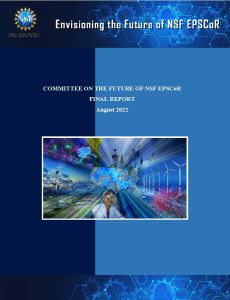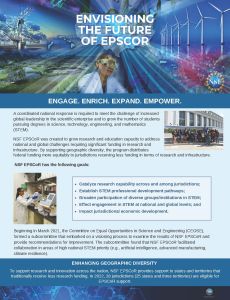NSF EPSCoR seeks to expand opportunities for diverse faculty, staff, and student populations through a geographic approach focused on strengthening research capabilities and competitiveness. The Committee on Equal Opportunities in Science and Engineering (CEOSE) established a subcommittee to conduct a visioning activity for the future of NSF EPSCoR. This site provides access to the report and its companion documents, along with an update on the NSF response to the report.
The Future of NSF EPSCoR Report
The Future of NSF EPSCoR Report provides fertile grounds for EPSCoR's future and advances geographic diversity in STEM research and education. The Committee on Equal Opportunities in Science and Engineering (CEOSE), formed a subcommittee that embarked on a visioning process to examine the results of NSF EPSCoR and provide recommendations for improvement. The Future of NSF EPSCoR Report identified eight recommendations in four topic areas: Research and Infrastructure Capacity and Competitiveness, Education and Workforce Development, Broadening Participation, and Economic Development to advance the EPSCoR program goals. Additionally, the report highlights several novel strategies to enhance support of the achievement of EPSCoR goals. This culminating video features the following NSF leadership, subcommittee members, and an EPSCoR funding recipient:
NSF Leadership: Drs. Alicia J. Knoedler, Sandra Richardson, and Sethuraman Panchanathan
CEOSE subcommittee: Drs. José Fuentes, Kelly Rusch, Prabhakar Clement, Daniela Marghitu, Marian McCord, Carol L. Silvia, and Scott Wicker
EPSCoR funding recipient: Dr. Prakash Nagarkatti
Credit: U.S. National Science Foundation
El Informe sobre el Futuro de NSF EPSCoR
El Informe sobre el Futuro de NSF EPSCoR proporciona un terreno fértil para el futuro de EPSCoR y promueve la diversidad geográfica en investigación y educación de STEM. El Comité de Igualdad de Oportunidades en Ciencia e Ingeniería (CEOSE) formó un subcomité que emprendió un proceso de visión para examinar los resultados de NSF EPSCoR y proporcionar recomendaciones para su mejora. El Informe sobre el Futuro de NSF EPSCoR identificó ocho recomendaciones en cuatro áreas temáticas: Capacidades y Competitividad de Investigación e Infraestructura, Desarrollo de la Educación y la Fuerza Laboral, Ampliación de la Participación, y Desarrollo Económico para avanzar en los objetivos del programa EPSCoR. Además, el informe destaca varias estrategias novedosas para mejorar el apoyo al logro de los objetivos de EPSCoR. Este video final presenta los siguientes líderes de NSF, miembros del subcomité y un receptor de fondos de EPSCoR:
Liderazgo de NSF: Drs. Alicia J. Knoedler, Sandra Richardson y Sethuraman Panchanathan; Subcomité de CEOSE: Drs. José Fuentes, Kelly Rusch, Prabhakar Clement, Daniela Marghitu, Marian McCord, Carol L. Silvia, Scott Wicker;
Receptor de fondos de EPSCoR: Dr. Prakash Nagarkatti.
Credit: U.S. National Science Foundation
Envisioning the future of NSF EPSCoR: Subcommittee co-chair, Jose D. Fuentes
Dr. Jose D. Fuentes (Professor, Penn State University) presents the findings and recommendations of The Envisioning the Future of EPSCoR Report. Dr. Fuentes is the chair of the Committee on Equal Opportunities in Science and Engineering (CEOSE) and co-chair of the Envisioning the Future of EPSCoR subcommittee. Dr. Fuentes highlights the successes of EPSCoR and discusses recommendations for the program’s future. He shares his hope for advancing geographic diversity and creating inclusive opportunities in STEM.
Credit: National Science Foundation
Envisioning the future of NSF EPSCoR video
In the video, Drs. Sethuraman Panchanathan, Alicia J. Knoedler, Sandra Richardson, and Kelly Rusch highlight the outcomes of the Envisioning the Future of NSF EPSCoR report. They also review the high-level achievements of the NSF EPSCoR program and express NSF’s continued dedication to furthering the impact of initiative in terms of building research infrastructure, supporting education and workforce development, as well as economic development and broadening participation in STEM across jurisdictions.
Credit: National Science Foundation
Envisioning the future of NSF EPSCoR: Education and workforce development
Dr. Prabhakar Clement (Professor, University of Alabama) introduces the recommendations offered by the CEOSE subcommittee in the NSF EPSCoR visioning process. The video identifies ways the EPSCoR programs contributes to Education and Workforce Development and presents recommendations to promote synergistic research and educational activities including, 1) funding large intra- and inter-jurisdictional grants to enable funding requests for the recruitment and retention of young faculty, thereby building a sustainable workforce and 2) expanding research and collaboration opportunities and related career support and mentoring for individuals at different career stages and pathways within NSF EPSCoR funding programs, especially those from underrepresented groups. These recommendations will build a strong framework to develop a sustainable STEM workforce.
Credit: National Science Foundation
Envisioning the future of NSF EPSCoR: Subcommittee member, Prakash Nagarkatti
Dr. Prakash Nagarkatti (Distinguished Professor, University of South Carolina) discusses the successes of South Carolina’s EPSCoR Track-1 program. As a member of the Committee on Equal Opportunities in Science and Engineering (CEOSE) subcommittee, Dr. Prakash emphasized the impact of EPSCoR on the collaboration across institutions to create research opportunities for underrepresented groups and to stimulate the state’s economy.
Credit: National Science Foundation
Envisioning the future of NSF EPSCoR: Subcommittee co-chair, Jose D. Fuentes (Español)
El Dr. José D. Fuentes (Catedrático, Penn State University) presenta los hallazgos y recomendaciones del reporte Previendo el Futuro de EPSCoR. El Dr. Fuentes es presidente del Comité de Igualdad de Oportunidades en Ciencias e Ingeniería (CEOSE por sus siglas en inglés) y co-presidente del subcomité Previendo el Futuro de EPSCoR. El Dr. Fuentes destaca los éxitos de EPSCoR y discute las recomendaciones para el futuro del programa. Él comparte sus expectativas de promover la diversidad geográfica y crear oportunidades inclusivas en STEM.”
Credit: National Science Foundation
Envisioning the future of NSF EPSCoR: Broadening participation
Dr. Scott Wicker (Associate Professor of Chemistry, Kentucky State University) introduces the recommendations offered by the CEOSE subcommittee in the NSF EPSCoR visioning process. The video reviews the benefits of Broadening Participation in science and research and presents recommendations to enhance participation including, 1) deepening inclusion strategies to include EPSCoR researchers, especially those from underrepresented groups, in all pre- and post-award facets of the program and 2) expanding access and opportunity for MSIs, PUIs and TYCs. These recommendations will catalyze science, discovery, and innovation.
Credit: National Science Foundation
Envisioning the future of NSF EPSCoR: Subcommittee member, Daniela Marghitu
Dr. Daniela Marghitu (Professor, Auburn University) discusses the Committee on Equal Opportunities in Science and Engineering (CEOSE) subcommittee’s goals and visioning process for the future of NSF EPSCoR. The goals include, 1) expanding and supporting human capital, 2) bridge building, and 3) strengthening resources and infrastructure. Dr. Marghitu explains how the subcommittee’s eight recommendations and nineteen suggestions intend to strengthen the EPSCoR program, providing enhanced support for jurisdictions to serve as a lever for American innovation.
Credit: National Science Foundation
Envisioning the future of NSF EPSCoR: Research and infrastructure capacity and competitiveness
Dr. Carol L. Silvia (Professor of Political Science, University of Oklahoma) introduces the recommendations offered by the CEOSE subcommittee in the NSF EPSCoR visioning process. The video reviews the needs identified by the Research and Infrastructure Capacity and Competitiveness subcommittee working group and their recommendations to address these needs, including investing in 1) diverse talent recruitment and retention and 2) the construction and modernization of physical and administrative infrastructure. These recommendations will broaden pathways of opportunity and expand the NSF EPSCoR program’s impact.
Credit: National Science Foundation
Envisioning the future of NSF EPSCoR: Economic Development
Dr. Marian McCord (Senior Vice Provost, University of New Hampshire) introduces the recommendations offered by the Committee on Equal Opportunity in Science and Engineering (CEOSE) subcommittee as a part of the NSF EPSCoR visioning process. The video highlights the impact EPSCoR has on Economic Development and presents recommendations to enhance EPSCoR’s achievements in support jurisdictional economic development. These include, 1) leveraging established funding programs at federal agencies and 2) building on jurisdiction’s unique strengths and priorities. These recommendations will encourage sustained economic growth and expansion of economic benefits across EPSCoR jurisdictions.
Credit: National Science Foundation



